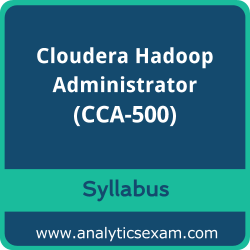 This page is a one-stop solution for any information you may require for Cloudera Certified Administrator for Apache Hadoop (CCAH) Certification exam. The Cloudera CCA-500 Exam Summary, Syllabus Topics and Sample Questions provide the base for the actual Cloudera Certified Apache Hadoop Administrator exam preparation, we have designed these resources to help you get ready to take your dream exam.
This page is a one-stop solution for any information you may require for Cloudera Certified Administrator for Apache Hadoop (CCAH) Certification exam. The Cloudera CCA-500 Exam Summary, Syllabus Topics and Sample Questions provide the base for the actual Cloudera Certified Apache Hadoop Administrator exam preparation, we have designed these resources to help you get ready to take your dream exam.
The Cloudera Certified Administrator for Apache Hadoop (CCAH) credential is globally recognized for validating Cloudera Hadoop Administrator knowledge. With the Cloudera Certified Apache Hadoop Administrator (CCA-500) Certification credential, you stand out in a crowd and prove that you have the Cloudera Hadoop Administrator knowledge to make a difference within your organization. The Cloudera Certified Administrator for Apache Hadoop (CCAH) Certification exam will test the candidate's knowledge on following areas.
Cloudera CCA-500 Exam Summary:
| Exam Name | Cloudera Certified Administrator for Apache Hadoop (CCAH) |
| Exam Code | CCA-500 |
| Exam Duration | 90 minutes |
| Exam Questions | 60 Questions |
| Passing Score | 70% |
| Exam Price | $295 (USD) |
| Training | Cloudera Administrator Training for Apache Hadoop |
| Books | |
| Exam Registration | Cloudera University |
| Sample Questions | Cloudera Hadoop Administrator Certification Sample Question |
| Practice Exam | Cloudera Hadoop Administrator Certification Practice Exam |
Cloudera CCA-500 Exam Topics:
| Objective | Details |
|---|---|
| HDFS (17%) |
- Describe the function of HDFS daemons
- Describe the normal operation of an Apache Hadoop cluster, both in data storage and in data processing
- Identify current features of computing systems that motivate a system like Apache Hadoop
- Classify major goals of HDFS Design
- Given a scenario, identify appropriate use case for HDFS Federation
- Identify components and daemon of an HDFS HA-Quorum cluster
- Analyze the role of HDFS security (Kerberos)
- Determine the best data serialization choice for a given scenario
- Describe file read and write paths
- Identify the commands to manipulate files in the Hadoop File System Shell
|
| YARN (17%) |
- Understand how to deploy core ecosystem components, including Spark, Impala, and Hive
- Understand how to deploy MapReduce v2 (MRv2 / YARN), including all YARN daemons
- Understand basic design strategy for YARN and Hadoop
- Determine how YARN handles resource allocations
- Identify the workflow of job running on YARN
- Determine which files you must change and how in order to migrate a cluster from MapReduce version 1 (MRv1) to MapReduce version 2 (MRv2) running on YARN
|
| Hadoop Cluster Planning (16%) |
- Principal points to consider in choosing the hardware and operating systems to host an Apache Hadoop cluster
- Analyze the choices in selecting an OS
- Understand kernel tuning and disk swapping
- Given a scenario and workload pattern, identify a hardware configuration appropriate to the scenario
- Given a scenario, determine the ecosystem components your cluster needs to run in order to fulfill the SLA
- Cluster sizing: given a scenario and frequency of execution, identify the specifics for the workload, including CPU, memory, storage, disk I/O
- Disk Sizing and Configuration, including JBOD versus RAID, SANs, virtualization, and disk sizing requirements in a cluster
- Network Topologies: understand network usage in Hadoop (for both HDFS and MapReduce) and propose or identify key network design components for a given scenario
|
| Hadoop Cluster Installation and Administration (25%) |
- Given a scenario, identify how the cluster will handle disk and machine failures
- Analyze a logging configuration and logging configuration file format
- Understand the basics of Hadoop metrics and cluster health monitoring
- Identify the function and purpose of available tools for cluster monitoring
- Be able to install all the ecoystme components in CDH 5, including (but not limited to): Impala, Flume, Oozie, Hue, Cloudera Manager, Sqoop, Hive, and PigCloudera Manager, Sqoop, Hive, and Pig
- Identify the function and purpose of available tools for managing the Apache Hadoop file systemHadoop file system
|
| Resource Management (10%) |
- Understand the overall design goals of each of Hadoop schedulers
- Given a scenario, determine how the FIFO Scheduler allocates cluster resources
- Given a scenario, determine how the Fair Scheduler allocates cluster resources under YARN
- Given a scenario, determine how the Capacity Scheduler allocates cluster resources
|
| Monitoring and Logging (15%) |
- Understand the functions and features of Hadoop’s metric collection abilities
- Analyze the NameNode and JobTracker Web UIs
- Understand how to monitor cluster daemons
- Identify and monitor CPU usage on master nodes
- Describe how to monitor swap and memory allocation on all nodes
- Identify how to view and manage Hadoop’s log files
- Interpret a log file
|
The Cloudera has created this credential to assess the knowledge and understanding of a candidate in the area as above via the certification exam. The Cloudera Hadoop Administrator (CCA-500) Certification exam contains a high value in the market being the brand value of the Cloudera attached with it. It is highly recommended to a candidate to do a thorough study and also get a hand full of the practice to clear Cloudera Certified Administrator for Apache Hadoop (CCAH) exam without any hiccups.
